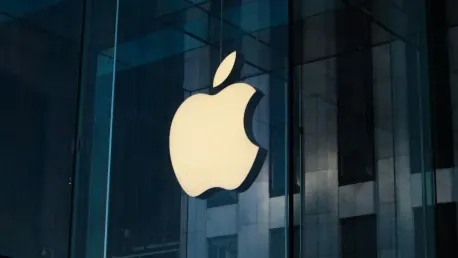Apple has announced its most significant investment to date, committing over $500 billion in the U.S. over the next four years, aiming to transform the American manufacturing landscape. This ambitious plan includes adding 20,000 new jobs to Apple’s existing 2.9 million-person U.S. workforce, focusing on key areas such as research and development, software development, silicon engineering, and artificial intelligence (AI). A major component of this initiative is the establishment of a new advanced manufacturing facility in Houston, scheduled to open in 2026, which will produce AI servers that were previously assembled overseas. In addition to this, Apple is set to double its contribution to the U.S. Advanced Manufacturing Fund from $5 billion to $10 billion and will launch an academy in Michigan tailored for small and medium-sized businesses concentrating on advanced manufacturing processes.
Shifting Focus to U.S. Manufacturing
Apple’s bold commitment aims to boost American innovation while reducing the company’s heavy dependence on Chinese production, a strategy that coincides with the recent trade tensions between Washington and Beijing. This announcement followed a meeting between CEO Tim Cook and President Donald Trump, during which Trump had imposed a 10% tariff on Chinese imports. By moving a significant portion of its manufacturing operations back to the U.S., Apple appears to be taking proactive measures in mitigating the impact of these trade policies. Historically, the tech giant has relied heavily on Chinese manufacturing hubs, but it seems the current geopolitical climate and economic pragmatism are catalyzing a pivotal shift.
In essence, this move by Apple is not only a reaction to immediate trade conflicts but also a strategic positioning that aligns with a broader trend among tech companies. Many in the sector are enhancing their U.S. manufacturing presence, driven by geopolitical considerations and a growing desire to nurture and develop local talent in high-skilled sectors. By bolstering its investment in U.S. innovation and manufacturing capabilities, Apple signals its confidence in American ingenuity and demonstrates a strategic response to the dynamic challenges of international trade.
Broader Implications for the U.S. Tech Industry
Apple’s unprecedented commitment could catalyze a ripple effect, prompting other tech giants to follow suit and scale up their domestic manufacturing operations. This could lead to a renaissance in American manufacturing, particularly in high-tech industries. The focus on advanced manufacturing processes and cutting-edge technologies like AI means these new jobs will require highly specialized skills, paving the way for a stronger emphasis on STEM education and workforce development. The investment in an academy for advanced manufacturing in Michigan underscores Apple’s dedication to fostering a skilled labor force capable of sustaining these high-tech operations.
The long-term implications for the U.S. tech industry could be profound. By bringing more of its manufacturing processes stateside, Apple ensures greater control over its supply chain and can nimbly adapt to changes in trade policies or global market conditions. Furthermore, this move could diminish the risk of supply chain disruptions, such as those experienced during the COVID-19 pandemic, thereby strengthening overall business resilience. At the same time, this strategy might encourage other tech companies to adopt similar measures, fostering an ecosystem of innovation and manufacturing excellence within the United States. While challenges remain, such as ensuring cost efficiency and maintaining a competitive edge, the potential benefits make this a monumental step for U.S. manufacturing.
A Strategic Pivot in a Changing World
Apple’s bold commitment to boosting American innovation while reducing dependence on Chinese production aligns with recent trade tensions between the U.S. and China. This initiative follows a meeting between CEO Tim Cook and President Donald Trump, during which Trump imposed a 10% tariff on Chinese imports. By moving part of its manufacturing back to the U.S., Apple is proactively addressing these trade policies’ impacts. Historically, Apple has relied on Chinese manufacturing, but the current geopolitical environment and economic pragmatism are driving a significant shift.
Apple’s move is more than just a reaction to trade conflicts; it’s a strategic repositioning in line with a broader industry trend. Many tech companies are increasing their U.S. manufacturing presence due to geopolitical factors and a desire to foster local talent in high-skilled sectors. By investing in U.S. innovation and manufacturing, Apple shows confidence in American ingenuity and strategically responds to the challenges of international trade. This move also strengthens America’s position in the tech industry, ensuring resilience and adaptability in a shifting global market.









